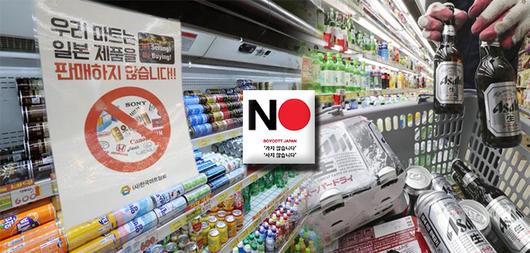 |
<이미지를 클릭하시면 크게 보실 수 있습니다> |
Regardless of smaller-than-expected impact on the economy from Tokyo’s delisting of South Korea from white-country status for fast-track in exports, South Koreans stayed disapproving of Japanese labels in the new year, with imports of Japanese consumer goods down 36 percent in January against a year-ago period.
According to Korea Customs Service data obtained by Kim Jung-woo, a lawmaker from the ruling Democratic Party on Tuesday, consumer goods imports from Japan totaled $193.7 million in January, down 35.9 percent from the same month a year ago.
The fall contributed most to the 8.9 percent year-on-year drop in the country’s entire consumer goods imports.
Japanese beer products suffered the biggest brunt of the lingering anti-Japan sentiment, with their imports plummeting 98.2 percent on year in January and 45 percent on month to $126,000 in January. Japanese beer brands used to account for the largest share of beer imports in Korea for the last 10 years, but their dominance has been seriously damaged by the boycott since July last year.
Japanese car imports also plunged 69.8 percent over the same period to $21.93 million. Vehicle registration of Japanese brands fell 64.8 percent on year in January and their share in the nation’s imported car market also shrank by 13.1 percentage points from a year ago to 7.5 percent, according to the Korea Automobile Importers & Distributors Association (KAIDA).
Motorcycle imports from Japan nosedived 98.9 percent to $20,000. Imports of Sake fell 66.7 percent, cigarettes 72.9 percent, toys 57.4 percent, processed food 54.7 percent and cosmetics 41.8 percent over the same period.
The nation’s consumer goods imports from Japan had dipped at a slower pace of 23.8 percent in December, compared to a 40.3 percent on-year decrease a month earlier. The December figure was even 20.1 percent higher than that of the previous month, suggesting easing in boycott movement. But the January figure confirmed antagonism remained intact.
Korean consumers began shunning Japanese goods from July 2019 when Tokyo imposed export curbs on three high-tech materials bound for Korea in an apparent retaliatory move against spat over past issues.
[ⓒ Maeil Business Newspaper & mk.co.kr, All rights reserved]
이 기사의 카테고리는 언론사의 분류를 따릅니다.
기사가 속한 카테고리는 언론사가 분류합니다.
언론사는 한 기사를 두 개 이상의 카테고리로 분류할 수 있습니다.
언론사는 한 기사를 두 개 이상의 카테고리로 분류할 수 있습니다.


